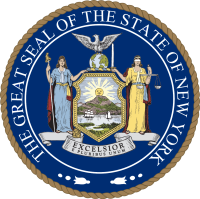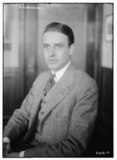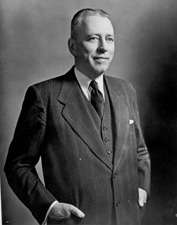1954 New York state election
The 1954 New York state election was held on November 2, 1954, to elect the Governor, the Lieutenant Governor, the State Comptroller, the Attorney General, the Chief Judge and three associate judges of the New York Court of Appeals, as well as all members of the New York State Assembly and the New York State Senate.
| |||||||||||||||||||||||
| |||||||||||||||||||||||
| |||||||||||||||||||||||
| Elections in New York State | ||||||||||||
|---|---|---|---|---|---|---|---|---|---|---|---|---|
 | ||||||||||||
|
||||||||||||
|
|
||||||||||||
|
||||||||||||
Background
This was the first election in which the voters were required to cast a single joint vote for governor and lieutenant governor, following the amendment to the State Constitution in 1953.
Chief Judge Edmund H. Lewis would reach the constitutional age limit of 70 years at the end of the year. He was elected in 1953, and John Van Voorhis was re-appointed on January 1, 1954, to the seat vacated by Lewis, to fill the vacancy temporarily.
Albert Conway and Charles S. Desmond had been elected to the Court of Appeals in 1940, thus their 14-year terms would expire at the end of the year.
Nominations
The Socialist Workers nominated David L. Weiss (born c. 1914), electronics worker, for governor; Dorothy Haines, of Buffalo, for lieutenant governor; Harold Robins, of New York City, for comptroller; and Catherine Gratta (born c. 1922), machine inspector, of Brooklyn, for attorney general.[1]
The American Labor Party nominated John T. McManus for governor; actress Karen Morley for lieutenant governor; Ralph Powe, lawyer, for Comptroller (the only African-American running for a statewide elective office this year); and George W. Fish, lawyer, of Brooklyn, for attorney general.[2]
The Socialist Labor Party filed a petition to nominate candidates as the Industrial Government Party on September 30. The ticket had only three names: Nathan Karp for governor; Stephen Emery for lieutenant governor; and John Emanuel for comptroller.[3]
The Democratic Party held its convention on September 21, 1954, in New York City. The main contest was for governor which was between former Secretary of Commerce W. Averell Harriman and Representative Franklin Delano Roosevelt Jr. Harriman had the backing of Tammany Hall and city organizations, Roosevelt agreed to drop out in exchange for his nomination for attorney general. The next week the Liberal Party of New York endorsed the entire Democratic slate.[4]
Result
Almost the whole Democratic/Liberal ticket was elected, only Republican Jacob K. Javits managed to be elected attorney general.
The incumbents Van Voorhis and Desmond were re-elected.
The American Labor Party lost its automatic ballot access and disbanded shortly afterwards.
| Office | Democratic ticket | Republican ticket | Liberal ticket | American Labor ticket | Socialist Workers ticket | Industrial Government ticket | ||||||
|---|---|---|---|---|---|---|---|---|---|---|---|---|
| Governor | W. Averell Harriman | 2,296,645 | Irving M. Ives | 2,549,613 | W. Averell Harriman | 264,093 | John T. McManus | 46,886 | David L. Weiss | 2,617 | Nathan Karp[5] | 1,720 |
| Lieutenant Governor | George B. DeLuca | J. Raymond McGovern | George B. DeLuca | Karen Morley | Dorothy Haines | Stephen Emery[6] | ||||||
| Comptroller | Arthur Levitt | 2,260,193 | Frank Del Vecchio[7] | 2,490,184 | Arthur Levitt | 255,481 | Ralph Powe | 50,911 | Harold Robins | 3,569 | John Emanuel | 2,244 |
| Attorney General | Franklin D. Roosevelt, Jr. | 2,185,272 | Jacob K. Javits | 2,603,858 | Franklin D. Roosevelt, Jr. | 245,687 | George W. Fish | 44,287 | Catherine Gratta | 4,059 | ||
| Chief Judge | Albert Conway | 2,263,688 | Albert Conway | 2,478,694 | Albert Conway | 261,153 | ||||||
| Judge of the Court of Appeals | Charles S. Desmond | 2,256,907 | Charles S. Desmond | 2,459,319 | Charles S. Desmond | 259,498 | ||||||
| Judge of the Court of Appeals | John Van Voorhis | 2,233,168 | John Van Voorhis | 2,450,362 | George Rifkin[8] | 280,656 | ||||||
| Judge of the Court of Appeals | Adrian P. Burke | 2,297,823 | Sydney F. Foster | 2,554,870 | Adrian P. Burke | 257,047 | ||||||
Note: The vote for governor is used to define ballot access, for automatic access are necessary 50,000 votes.
Notes
- A.L.P. Legal Future At Stake on Tuesday; A.L.P. Must Poll 50,000 Votes To Remain a Recognized Party in NYT on October 30, 1954 (subscription required)
- A.L.P. Legal Future At Stake on Tuesday; A.L.P. Must Poll 50,000 Votes To Remain a Recognized Party in NYT on October 30, 1954 (subscription required)
- CANDIDATE SLATE FILED; Industrial Government Party to Seek Three Offices in NYT on October 1, 1954 (subscription required)
- CANDIDATE SLATE FILED; Industrial Government Party to Seek Three Offices in NYT on October 1, 1954 (subscription required)
- Nathan Karp (born c. 1915), clothing cutter, of Queens, ran also for lieutenant governor in 1950; for the U.S. Senate in 1952; and for Mayor of New York in 1953
- Stephen Emery, subway train dispatcher, of New York City, ran also for the U.S. Senate in 1950
- Frank Del Vecchio, of Syracuse, D.A. of Onondaga County, later New York Supreme Court justice (5th District)
- George Rifkin (c. 1907-1972), labor lawyer, of Queens, GEORGE RIFKIN DIES; LABOR LAWYER, 65 Obit in NYT on February 19, 1972 (subscription required)
Sources
- Results in HARRIMAN MARGIN LOWEST SINCE 1850; Chosen Governor by 11,125 in Official Tally; All-Time Low in Race 108 in 1792 in NYT on December 17, 1954 (subscription required) [The headline refers to the New York state election, 1850, in which Washington Hunt defeated Horatio Seymour by 262 votes; and to the New York gubernatorial election, 1792 in which the incumbent Governor George Clinton was re-elected by 108 votes over John Jay, after the controversial exclusion of several hundred votes from three counties.]
- Results in the New York Red Book (1955)

